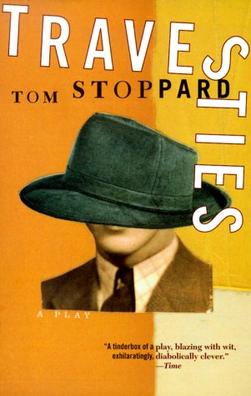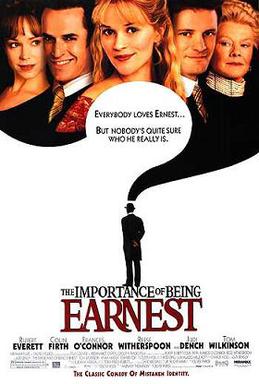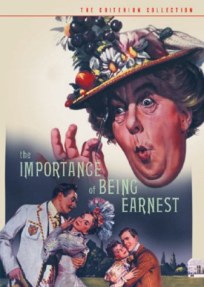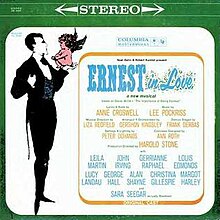Background
The two-act musical is an expanded version of the hour-long musical Who's Earnest? televised on The United States Steel Hour in 1957. [1]
The 1959-1960 Off-Broadway season included a dozen musicals and revues including Little Mary Sunshine , The Fantasticks (based on an obscure 1894 work by Edmond Rostand, of Cyrano fame), and Ernest in Love, a musicalization of Oscar Wilde's 1895 hit. The production was directed by Harold Stone and choreographed by Frank Derbas. It opened on May 4, 1960, at the Gramercy Arts Theatre, where it was warmly received by the critics but ran for only 103 performances. The cast included Louis Edmonds as Algernon, John Irving as Jack, Leila Martin as Gwendolen, Gerrianne Raphael as Cecily, Sara Seegar as Lady Bracknell, Lucy Landau as Miss Prism, George Hall as Dr. Chausable, Christina Gillespie as Effie, and Alan Shayne as Lane. It was then revived thereafter in stock and amateur productions, at least into the early 1960s. [1]
An original cast recording was released by Columbia Records. In 2003, a compact disc transfer was issued on the DRG label.
The Japanese all-female musical theatre troupe Takarazuka Revue staged the musical in 2005 in two productions, one by Moon Troupe (featuring the debut of Jun Sena and Kanami Ayano) the other one by Flower Troupe (the last production for Sakiho Juri for the company), and the other one by Flower Troupe (led by Rio Asumi and featuring the debut of Maria Kano).
In 2010, an Off Broadway revival of Earnest in Love was presented by the Irish Repertory Theatre.
Synopsis
- Act I
In Victorian era London, tradesmen and valets debate the upper class's failure to pay their bills on time, with the tradesmen accusing, and the valets fervently defending, their employers ("Come Raise Your Cup"). Lane, a valet, returns home to find his master, Ernest Worthing, rehearsing the proper words to say to Miss Gwendolen Fairfax, to whom he intends to propose that afternoon ("How Do You Find the Words?"). Gwendolen, meanwhile, with the help of her maid Alice, is searching for "The Hat" that will impress Mr. Worthing enough to elicit a proposal.
Ernest visits his friend Algernon Moncrieff, who accuses him of leading a double-life. While in the country, where he lives, Ernest goes by the name of Jack (which he believes to be his real name) and pretends that he has a wastrel brother named Ernest, who lives in London and requires his frequent attention. Jack must assume a serious attitude for the benefit of his young ward, Cecily, an 18-year-old heiress and granddaughter of Jack's late adoptive father. When in the city, he becomes the profligate Ernest. Algernon explains to Jack that he has an imaginary friend named Bunbury who lives in the country and is frequently in ill health: whenever Algernon wants to avoid an unwelcome social obligation, or just get away for the weekend, he "visits his sick friend". He calls this delightful practice "Bunburying" ("Mr. Bunbury").
Gwendolen and her mother Lady Bracknell come to call, and Jack proposes to Gwendolen ("Perfection"). She joyously accepts, but Jack is worried that Gwendolen seems to love him largely for his name, Ernest, which she thinks the most beautiful name in the world. In addition, Gwendolen's mother, the terrifying Lady Bracknell, does not approve of Ernest and is further horrified to learn that he was adopted as a baby after being discovered in a handbag at a railway station ("A Handbag is not a Proper Mother"). She advises him to find one or both parents before the season is out. Meanwhile, Jack's description of his pretty ward Cecily has so appealed to Algernon that he resolves to meet her, in spite of Jack's firm opposition.
Assuming the identity of Ernest, Algernon visits Jack's house in the country. Cecily has for some time imagined herself in love with the mysterious Ernest, whom Jack has told her is "A Wicked Man". Her governess, Miss Prism, is easily distracted by the attentions of the clergyman Dr. Chasuble ("Metaphorically Speaking"). Jack, meanwhile, has decided to put his life as Ernest behind him. He is forced to abandon his intention to declare that his brother Ernest has died in Paris by the presence of Algernon in the role of "Ernest", who threatens to expose Jack's double life if the latter doesn't play along.
- Act II
Lane, the valet, and Cecily's maid Effie, lament the way the upper classes make love so difficult ("You Can't Make Love"); as servants, they find it much easier together. Cecily is swept off her feet by Algernon, and she accepts his proposal ("Lost"). Cecily admits to her "Ernest" that she loves him at least in part for his name. Algernon and Jack, unbeknownst to each other, each ask the local rector, Rev Canon Chasuble, to be baptised as "Ernest".
Gwendolen flees London and her mother to be with her love. When she and Cecily meet for the first time, she declares that she can always recognize a lady and knows immediately that she and Cecily will be great friends ("My Very First Impression"). Upon discussing their engagements, though, each indignantly insists that she is the one engaged to "Ernest". This results in verbal conflict until Jack and Algernon appear and their deceptions are exposed. Since neither is named Ernest, the girls renounce their engagements and walk away, their noses in the air. Jack deplores their situation, but Algernon calmly consumes his tea ("The Muffin Song").
The couples soon reconcile when the girls learn of Jack and Algernon's plans to be christened. They all swear "Eternal Devotion". Lady Bracknell arrives in pursuit of her daughter. She meets Cecily and finds her as a suitable wife for Algernon, especially when the amount in her trust fund is revealed. However, Lady Bracknell still refuses to countenance Jack's marriage to Gwendolen, while he, in retaliation, denies his consent to the marriage of his heiress ward Cecily to her penniless nephew Algernon ("The Muffin Song (reprise)").
The impasse is broken by the appearance of Cecily's governess, Miss Prism. As she and Lady Bracknell recognize each other with horror, it is revealed that, when working many years previously as a nursemaid for Lady Bracknell's late sister, Miss Prism had disappeared with the sister's child, a baby boy. Miss Prism reveals that, in a moment of distraction, she had placed the baby in a handbag and put the manuscript of a novel she had been writing in the perambulator. The handbag was left at Victoria station and, when she realised her mistake, Miss Prism had fled. When Jack produces the handbag in which he was found, it becomes clear that he is Lady Bracknell's nephew and Algernon's older brother.
Dr. Chasuble remembers that Jack was named after his father, Ernest John. Jack, now truly Ernest, receives Gwendolen's forgiveness for the fact that he has been telling the truth all along. The happy couples embrace, including Miss Prism and her clerical admirer, the Reverend Canon Chasuble ("Ernest in Love").

The Importance of Being Earnest, a Trivial Comedy for Serious People is a play by Oscar Wilde, the last of his four drawing-room plays, following Lady Windermere's Fan (1892), A Woman of No Importance (1893) and An Ideal Husband (1895). First performed on 14 February 1895 at the St James's Theatre in London, it is a farcical comedy depicting the tangled affairs of two young men about town who lead double lives to evade unwanted social obligations, both assuming the name Ernest while wooing the two young women of their affections.

Dame Margaret Taylor Rutherford, was an English actress of stage, film and television.

Dame Edith Mary Evans, was an English actress. She was best known for her work on the West End stage, but also appeared in films at the beginning and towards the end of her career. Between 1964 and 1968, she was nominated for three Academy Awards.

Travesties is a 1974 play by Tom Stoppard. It centres on the figure of Henry Carr, an old man who reminisces about Zürich in 1917 during the First World War, and his interactions with James Joyce when he was writing Ulysses, Tristan Tzara during the rise of Dada, and Lenin leading up to the Russian Revolution, all of whom were living in Zürich at that time.

Jennifer "Gemma" Jones is an English actress. Appearing on both stage and screen, her film appearances include Sense and Sensibility (1995), the Bridget Jones series (2001–2016), the Harry Potter series (2002–2011), You Will Meet a Tall Dark Stranger (2010), and Ammonite (2020).

Dilys Laye was an English actress and singer, best known for her comedy roles, in which she was seen in the West End and on Broadway for more than fifty years, beginning in 1951. Although primarily a stage performer, she broadcast frequently on radio and television, and appeared in films.

Dulcie Winifred Catherine Savage Denison,, known professionally as Dulcie Gray, was a British actress, mystery writer and lepidopterist.

John Michael Terence Wellesley Denison was an English actor. He often appeared with his wife, Dulcie Gray, with whom he featured in several films and more than 100 West End theatre productions.

The Importance of Being Earnest is a 2002 romantic comedy-drama film directed by Oliver Parker, based on Oscar Wilde's classic 1895 comedy of manners of the same name. A British-American co-production, the film stars Colin Firth, Rupert Everett, Reese Witherspoon, and Judi Dench in lead roles, with Tom Wilkinson and Frances O'Connor in supporting roles. The original music score is composed by Charlie Mole.

The Importance of Being Earnest is a 1952 British comedy-drama film adaptation of the 1895 play by Oscar Wilde. It was directed by Anthony Asquith, who also adapted the screenplay, and was produced by Anthony Asquith, Teddy Baird, and Earl St. John.
Rebecca Night is an English actress who starred in the title role of James Hawes's BBC Four adaptation Fanny Hill. Night and Stockard Channing co-starred as Jessie and Thelma in Marsha Norman's Pulitzer-Prize-winning play 'night, Mother at Hampstead Theatre. On her performance, described by lead theatre critic Mark Shenton: "Night is like a young Julia Roberts... with natural stage chops... It turns out to be a riveting, revealing evening."
Lee Julian Pockriss was an American songwriter who wrote many well-known popular songs and several scores for films and Broadway shows, mainly during the 1960s and 1970s.

Evelyn Mary Millard was an English Shakespearean actress, actor-manager and "stage beauty" of the late nineteenth and early twentieth centuries perhaps best known for creating the role of Cecily Cardew in the 1895 premiere of Oscar Wilde's play The Importance of Being Earnest.
The Importance of Being Earnest is a filmed version of the 2011 Broadway revival production of Oscar Wilde's 1895 play of the same name. The film is directed by and stars Brian Bedford.
Sara Topham is a Canadian actress. She is primarily associated with stage roles at the Stratford Shakespeare Festival in Ontario, Canada.

The Importance of Being Earnest is a three-act opera by Gerald Barry based on the 1895 play of the same name by Oscar Wilde. The opera was given concert performances in Los Angeles in 2011 and in London and Birmingham in 2012, and received its first fully staged performances in 2013 at the Opéra national de Lorraine, Nancy. Its first British staged performance took place at the Linbury Studio Theatre, Covent Garden, in 2013.
The Importance of Being Earnest is a 1957 Australian TV performance of the 1895 play by Oscar Wilde. It was directed by Paul O'Loughlin. It was made at a time when Australian drama production was rare.
To Hell in a Handbag: The Secret Lives of Canon Chasuble and Miss Prism is a 2016 play by the Irish actor/writers Helen Norton and Jonathan White. It deals with two minor characters from Oscar Wilde’s play The Importance of Being Earnest.
The Importance of Being Earnest is a 1992 American film adaptation of the 1895 play of the same name by Oscar Wilde, featuring an all-black cast.

Helen Rous was a versatile Irish actor who played many times on the London stage. Her parts included supporting roles in works by Oscar Wilde and George Bernard Shaw.












